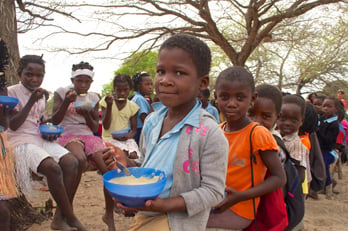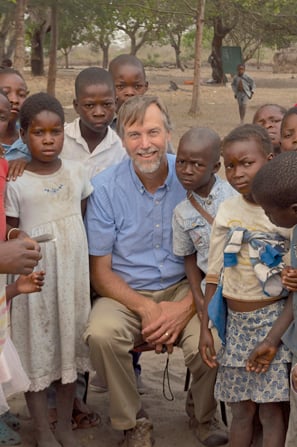USDA's McGovern-Dole Program

(This article first appeared on the Hunger and Undernutrition Blog)
President Abraham Lincoln once called the Department of Agriculture "The People's Department." Lincoln signed the law that created the Department of Agriculture in 1862. Today, 150 years later the USDA continues to help improve conditions not only for Americans but for individuals and communities around the globe.
Most people associate foreign assistance with the U.S. Agency for International Development (USAID). Few know about the USDA's role in promoting U.S. goodwill overseas through educational and nutritional support. A cornerstone of the USDA's effort is the McGovern-Dole International Food for Education and Child Nutrition Program.
McGovern-Dole was originally authorized by the Farm Security and Rural Investment Act of 2002. Named in honor of Ambassador and Senator George McGovern and Senator Robert Dole -- both renowned proponents of food security and improved nutrition -- the McGovern-Dole Program aims to reduce hunger and improve literacy and primary education, especially for girls. By providing school meals, teacher training, and related support, the program boosts school enrollment and academic performance. It is designed to help developing countries set up their own school lunch programs, so that one day they can take full responsibility for feeding their students. In other words, McGovern-Dole does not offer a handout, but a hand up.
 In April of 2012, the USDA awarded Planet Aid $20 million under the McGovern-Dole Program to provide food aid and implement education and nutrition programs in Mozambique. Beginning in 2013, the program will provide daily school meals to 60,000 children in Maputo Province - totaling 34 million meals over three years.
In April of 2012, the USDA awarded Planet Aid $20 million under the McGovern-Dole Program to provide food aid and implement education and nutrition programs in Mozambique. Beginning in 2013, the program will provide daily school meals to 60,000 children in Maputo Province - totaling 34 million meals over three years.
But that's not all. To develop local capacity for improving nutrition, positive learning outcomes and childhood education overall, Planet Aid and its local partner ADPP, in partnership with the American Soybean Association's WISHH program (World Initiative for Soy in Human Health), will reach 1 million Mozambicans with nutrition education.
The education component of the Planet Aid program will focus on training more than 4,000 primary school teachers. Training will include courses in nutrition, community health practices, and small-scale agricultural and economic development techniques. Upon graduation, the teachers will reach 264,000 primary school students each year.
To complement the education, nutrition and school-feeding aspects, Planet Aid and ADPP will also carry out other initiatives to address critical community needs. All schools in the program will be equipped with necessary kitchen and storage space. Schools currently without a dependable water source will receive a potable water supply, and some schools will deploy point-of-use water purification systems for the duration of the program. To instruct students and the local communities in agricultural practices, selected schools will establish a school garden. To ensure proper sanitation, all schools in the program will receive newly-constructed or upgraded latrines as necessary.
Planet Aid and its partners are currently gearing up to begin this exciting project. Stay tuned for updates about our experience in Mozambique.
